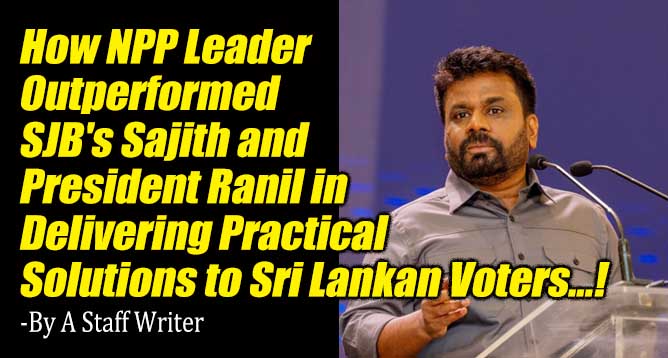-By A Staff Writer

(Lanka-e-News -18.Sep.2024, 11.00 pm) In the recent political landscape of Sri Lanka, the leader of the National People's Power (NPP) has emerged as a dynamic force, offering practical solutions to the issues plaguing the country. While the leader of the Samagi Jana Balawegaya (SJB), Sajith Premadasa, and President Ranil Wickremesinghe have been attempting to address the nation's challenges, the NPP leader has stood out with a clear vision and direct communication, resonating deeply with Sri Lankan voters.
Sri Lanka is grappling with a crippling economic crisis—spiraling costs of living, widespread unemployment, and the collapse of small and medium-sized enterprises (SMEs). This dire situation has pushed many Sri Lankans to seek employment abroad, as opportunities shrink at home. The NPP leader has consistently addressed these issues at political rallies, offering straightforward, practical solutions to complex problems.
The NPP's message centers on the need for economic reform. With Sri Lanka facing an unsustainable national debt - over $55 billion - he has taken a critical stance on the International Monetary Fund's (IMF) rescue plans and the nation's debt restructuring strategy. Unlike other political leaders, he has framed these issues in a way that connects with everyday citizens, explaining how government policies directly impact their livelihoods.
A key pillar of the NPP's platform is tackling the endemic corruption that has plagued Sri Lankan politics for decades. The NPP leader has been vocal about recovering the wealth siphoned off by the political elite and hidden in offshore accounts. This includes exposing hidden assets linked to powerful families like the Rajapaksas and others, with international investigative journalists uncovering nearly 989 such accounts, where $2.5 billions worth deposits. By bringing this issue to the forefront, the NPP leader has positioned himself as a champion of transparency and accountability.
He has also assured the business community that under NPP leadership, Sri Lanka will maintain a business-friendly, market-oriented economy. However, this will come with new mechanisms to eliminate corruption, ensuring fair competition. The leader has criticized the previous political classes, which favored a small group of businesses through commissions and bribes, stifling fair wealth distribution and stunting the growth of entrepreneurship.
While the IMF has been seen as a necessary player in Sri Lanka's recovery, its reforms often come with painful cuts to social welfare programs and increased taxes on ordinary people. The NPP has pledged a balanced approach, ensuring that the burden does not fall disproportionately on the working class. The leader has been in dialogue with IMF teams, advocating for a restructuring plan that would alleviate the suffering of the most vulnerable.
Unlike other political parties that have appeared to follow IMF prescriptions without question, the NPP seeks a middle path—acknowledging the need for reforms while protecting the social safety net.
The NPP leader has also been actively engaging with international diplomatic missions, aiming to restore Sri Lanka’s credibility on the global stage. His strategy involves building trust with the international community and pursuing a balanced foreign policy, crucial in a region where both India and China wield significant influence. By maintaining equidistant relations with both these regional powers, the NPP seeks to strengthen Sri Lanka's sovereignty and negotiate better terms for foreign investments and aid.
As the NPP's popularity has grown, the party has faced misinformation campaigns, notably from the SJB. One of the most damaging falsehoods is the claim that the NPP would strip Buddhism of its special status in the constitution and interfere with religious practices. These accusations suggested that the NPP would curtail Buddhist cultural events and restrict Muslim religious freedoms, including prayer rituals. The NPP leader has firmly denied these allegations, emphasizing that his party has no intention of meddling in the religious practices of any community.
In an environment of political stagnation, the NPP leader has distinguished himself with his straightforward communication and practical solutions. While traditional parties like the SJB and the United National Party (UNP) have failed to inspire confidence in their ability to address the nation's crises, the NPP has offered a clear path forward, grounded in economic reform, anti-corruption measures, and balanced international diplomacy. For Sri Lankan voters, weary of the old political guard, the NPP presents a hopeful alternative capable of delivering real change.
---------------------------
by (2024-09-18 18:36:59)
Leave a Reply